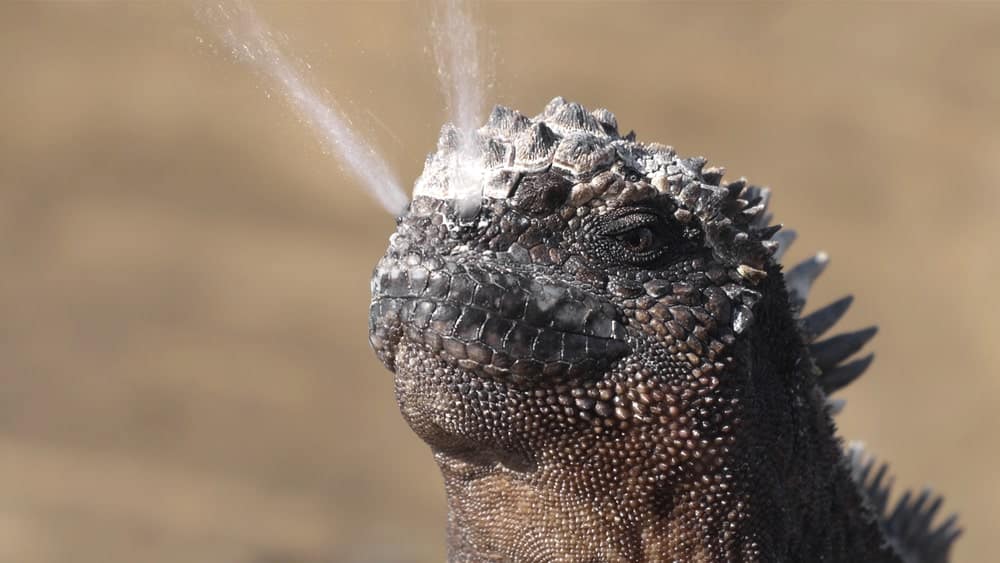Iguanas are one of the most popular reptile pets in all of America. They gained popularity after the hit movie Jurassic Park and are considered part of the “dinomania” phenomena hitting homes everywhere. Most iguanas and other exotic pets bought in pet stores are hatched in South and Central America at “reptile ranches”. Unfortunately, the bacteria they bring to the United States are just as exotic.
Pet owners must wash hands and be aware of iguana diseases and their health risks. If you are dealing with iguanas in your yard, you can make home modifications for repelling iguanas or set traps to euthanize iguanas humanely to avoid zoonotic disease.
What Diseases Do Iguanas Carry?
Salmonella
Like most other reptiles, iguanas carry salmonella in the lining of their intestinal tract. Salmonella causes gastrointestinal disease in humans. While this is not harmful to the animal, when pet iguanas or wild iguanas pass salmonella bacteria through fecal matter, the reptiles get it on their skin, allowing them to spread the salmonella to people and pets.
Adults with fully functional and healthy immune systems typically suffer only mild gastroenteritis (fever, vomiting, abdominal cramps, diarrhea). In more severe cases, higher-risk individuals such as those taking antibiotics, immunocompromised persons, the elderly, pregnant women, and children under 5 are more seriously affected by salmonella infection. Salmonella infections can cause severe abdominal pain, septicemia, miscarriage, and meningitis.

Metabolic Bone Disease
The disease most likely to be seen in iguanas is metabolic bone disease. It typically occurs because of an improper feeding diet that is too low in calcium and vitamin D3 or too high in phosphorus, or from a lack of UV light. Metabolic bone disease is most often seen in juvenile iguanas.
Chrysosporium Anamorph of Nannizziopsis Vriesii (CANV)
Another common disease in young iguanas is CANV, which is a fungal skin infection also known as Yellow Fungus Disease. It causes crusty yellow or tan skin lesions on the iguana’s body. In some cases, CANV may be fatal.
Infectious Stomatitis (Mouth Rot)
This bacterial infection leads to swollen gums and causes the iguana to produce thick excess mucus in the mouth. Mouth rot causes swelling along the jaw and gum line, where a solid abscess can be formed in the soft tissue of the gums. It may be difficult for pet owners to check for mouth rot due to the serrated teeth of iguanas.
Respiratory Infections
A respiratory disease such as pneumonia can be caused by cold or dirty conditions, being improperly fed, or in iguanas that are stressed out. If untreated, an iguana may experience shallow or unnaturally rapid breathing, gasping for air, lethargy, or even death.
Intestinal Parasites
Intestinal parasites are common in pet iguanas, and few signs of sickness are shown until a fecal examination occurs. Pinworms are a typical intestinal parasite that causes weight loss or diarrhea. Ticks and mites can also cause iguana diseases. They can be found crawling around the legs, head, and skin folds of iguanas.
Hypervitaminosis D
This condition occurs when pet owners feed iguanas cat or dog food or over-supplement them with vitamins and minerals. Pet iguanas may show signs of lethargy or lack of appetite. Treatment for hypervitaminosis D requires intense medical attention and force-feeding to lower vitamin D levels.
Avascular Necrosis
Iguanas can be afflicted with a condition known as avascular necrosis when the blood vessels that supply a part of the body become obstructed. This causes necrosis of the affected tissue because of the lack of blood supply. This can occur most often in an affected tail or toe, and the infected area can become firm to the touch, black, and dry.
Abscesses
An abscess is a pus-filled swelling that is common in iguanas. It can occur when fungi or bacteria enter the tissue through a bite wound, a tumor, or certain parasites. They are diagnosed by palpitation, fine needle aspiration, and sometimes surgical exploration. They are treated by lancing and flushing the abscess or through surgical removal.
Dystocia
Also known as egg binding, dystocia occurs when a female iguana cannot pass her eggs. This can be caused by improper environmental lighting, an inadequate nest site, improper diet, and dehydration. Proper care of pet iguanas can help prevent such health problems.
A normal gravid lizard will be bright, alert, and active but may not eat. A gravid lizard suffering dystocia will have a limited appetite, appear swollen, and become progressively lethargic, sick, and unresponsive.
Cystic Calculi
Also known as bladder stones, cystic calculi commonly occur when pet owners feed their iguanas food for cats or dogs. Bladder stones require immediate treatment. Antibiotic therapy may be needed after the surgical removal of the stones to prevent bacterial infection.
Avoiding Iguana Diseases in Humans
You can help avoid these common diseases by remembering to wash your hands after handling iguanas and other reptiles.
Homeowners deal with the issues of disease control outdoors as well. Orange County residents are encouraged to remove iguana pests from their property to avoid the common diseases that iguanas can carry. It is important to remember that it is unlawful to sell or relocate iguanas. If you need assistance with iguana removal, Iguana Control is here to help. Contact us today for a free estimate.


